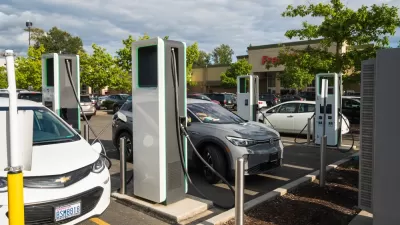The Financial Times analyzes the effects of the falling price of oil on energy markets and concludes that the short term economic gain for oil consumers will come back to bite them as investments in alternative fuels will cease as will conservation.
"The plunging oil price is like a dangerously addictive painkiller: short-term relief is being provided at a cost of serious long-term harm.
It took more than four years for oil to go from $35 per barrel in 2004 to over $147 in July 2008, and less than six months to fall all the way back again.
More expensive forms of oil such as Canada's tar sands, and alternatives to oil, such as biofuels, are at risk.
Cheaper oil and other forms of energy also weaken the incentive for businesses and consumers to use fuel more carefully.
It is not only transport fuels, which compete directly with crude oil, that are affected. The price of oil is tied to the price of natural gas – formally by contract in some regions such as the European Union and Japan, informally elsewhere – so the price of gas has also fallen sharply.
That throws into doubt the economics of forms of generation that compete with gas, including nuclear, renewables such as wind and solar, and coal."
"Analysts such as Philip Gordon of the Brookings Institution have argued that Washington should set an oil price floor of $60 per barrel to give investors the certainty to invest in alternatives, but that idea faces practical hurdles. Higher petrol taxes – common in Europe – could encourage fuel efficiency and electric cars in the US, but are also highly controversial."
From The Washington Post op-ed - Charles Krauthammer, "Tax & Drill":
"The idea is for the government -- through a tax -- to establish a new floor for gasoline, say $3 a gallon. If the world price were to rise above $3, the tax would be zero."
FULL STORY: Over a barrel

Alabama: Trump Terminates Settlements for Black Communities Harmed By Raw Sewage
Trump deemed the landmark civil rights agreement “illegal DEI and environmental justice policy.”

Study: Maui’s Plan to Convert Vacation Rentals to Long-Term Housing Could Cause Nearly $1 Billion Economic Loss
The plan would reduce visitor accommodation by 25% resulting in 1,900 jobs lost.

Planetizen Federal Action Tracker
A weekly monitor of how Trump’s orders and actions are impacting planners and planning in America.

Waymo Gets Permission to Map SF’s Market Street
If allowed to operate on the traffic-restricted street, Waymo’s autonomous taxis would have a leg up over ride-hailing competitors — and counter the city’s efforts to grow bike and pedestrian on the thoroughfare.

Parklet Symposium Highlights the Success of Shared Spaces
Parklets got a boost during the Covid-19 pandemic, when the concept was translated to outdoor dining programs that offered restaurants a lifeline during the shutdown.

Federal Homelessness Agency Places Entire Staff on Leave
The U.S. Interagency Council on Homelessness is the only federal agency dedicated to preventing and ending homelessness.
Urban Design for Planners 1: Software Tools
This six-course series explores essential urban design concepts using open source software and equips planners with the tools they need to participate fully in the urban design process.
Planning for Universal Design
Learn the tools for implementing Universal Design in planning regulations.
Caltrans
Smith Gee Studio
Institute for Housing and Urban Development Studies (IHS)
City of Grandview
Harvard GSD Executive Education
Toledo-Lucas County Plan Commissions
Salt Lake City
NYU Wagner Graduate School of Public Service




























